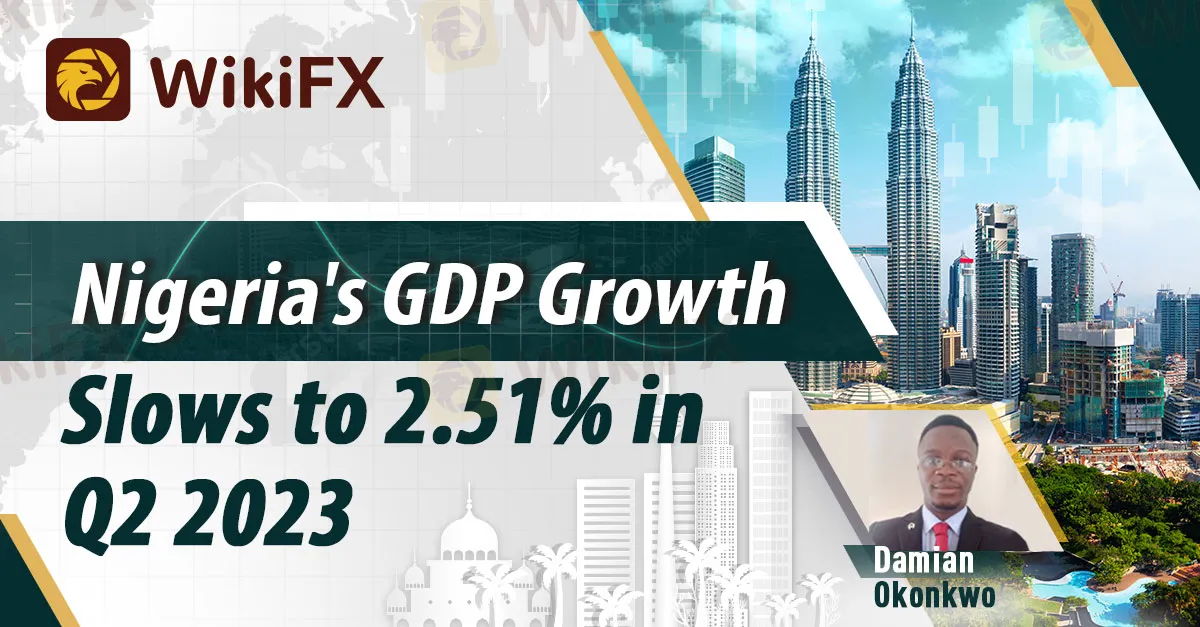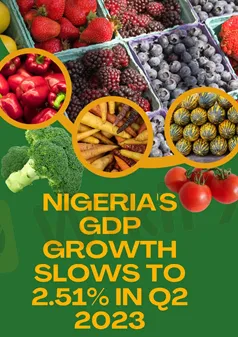简体中文
繁體中文
English
Pусский
日本語
ภาษาไทย
Tiếng Việt
Bahasa Indonesia
Español
हिन्दी
Filippiiniläinen
Français
Deutsch
Português
Türkçe
한국어
العربية
Nigeria's GDP Growth Slows to 2.51% in Q2 2023
Abstract:Nigeria's GDP slowed to 2.51% in the second quarter of 2023, down from 3.54% in the same quarter of 2022. This marked the lowest growth rate in Nigeria since the third quarter of 2020.

By: Damian Okonkwo

Abuja, Nigeria - Nigeria's gross domestic product (GDP) growth slowed to 2.51% in the second quarter of 2023, down from 3.54% in the same quarter of 2022, according to the National Bureau of Statistics (NBS).
This marked the lowest growth rate in Nigeria since the third quarter of 2020. The high level of decline witnessed in the country's GDP growth rate has been attributed to many factors, including:
● The removal of fuel subsidies in Nigeria in June, which has increased the cost of living for households.
● A weak currency, which has made it more expensive to import goods and services.
● A high level of debt, which is putting a strain on the government's finances.
● A lack of investment, which is hindering economic growth.
● A poor infrastructure, which is making it difficult to do business in Nigeria.
● The ongoing war in Ukraine, which has disrupted global supply chains and caused commodity prices to rise.
In addition to these factors, the Nigerian economy is also facing many other challenges, including:
● Security crisis, which is disrupting economic activity in some parts of the country.
● An increasing population with scarce resources.
● Climate change, which is causing more extreme weather events and making it more difficult to produce food.
The government has taken some steps to address the economic slowdown, including raising interest rates and devaluing the naira. However, these measures seem to have put more pressure on the economy, with more businesses folding up due to the high cost of borrowing.
Analysts are divided on the outlook for the Nigerian economy in the coming months. Some believe that the economy will continue to slow, while others believe that it will start to recover in the second half of the year.
The current economic slowdown has increased the hardship in the country, and the government is expected to take more urgent action to address the challenges facing the country.
The government can consider many measures to stimulate economic growth, including:
● Investing in infrastructure, such as roads, railways, and power plants.
● Promoting exports and attracting foreign investment.
● Reforming the education and healthcare systems.
● Working to improve the security situation in Nigeria.
The government also needs to work with the private sector to develop a plan for economic growth. The private sector is the engine of growth in any economy, and the government needs to create an environment where businesses can thrive.
Conclusion
The Nigerian economy is facing many challenges, but there are also growth opportunities. If the government takes the right steps, the economy could start to recover in the second half of the year. However, the situation could get worse if the government fails to take urgent measures to redeem the present economic distress in the region.

Disclaimer:
The views in this article only represent the author's personal views, and do not constitute investment advice on this platform. This platform does not guarantee the accuracy, completeness and timeliness of the information in the article, and will not be liable for any loss caused by the use of or reliance on the information in the article.
Read more

Malaysian-Thai Fraud Syndicate Dismantled, Millions in Losses Reported
The Royal Malaysia Police (PDRM) has received 26 reports concerning the Nicshare and CommonApps investment schemes, both linked to a major fraudulent syndicate led by a Malaysian citizen. The syndicate’s activities came to light following the arrest of its leader by Thai authorities on 16 December.

Top 10 Trading Indicators Every Forex Trader Should Know
Master the top 10 Forex trading indicators to analyze real-time Forex quotes, trends, and market signals. Learn strategies to boost accuracy and avoid mistakes.

WikiEXPO Global Expert Interview: Simone Martin—— Exploring Financial Regulation Change
In the midst of financial innovation and regulation, WikiGlobal, the organizer of WikiEXPO, stays abreast of industry trends and conducts a series of insightful and distinctive interviews on pivotal topics. We are delighted to have the privilege of inviting Simone Martin for an in-depth conversation this time.

CySEC Settles Compliance Case with Fxview Operator Charlgate Ltd
Discover how CySEC resolved compliance issues with Charlgate Ltd, the operator of Fxview, through a €50,000 settlement. Explore the investigation, regulatory measures, and CySEC's new website designed for improved accessibility and transparency.
WikiFX Broker
Latest News
Geopolitical Events: What They Are & Their Impact?
Top 10 Trading Indicators Every Forex Trader Should Know
ASIC Sues Binance Australia Derivatives for Misclassifying Retail Clients
WikiFX Review: Is FxPro Reliable?
Malaysian-Thai Fraud Syndicate Dismantled, Millions in Losses Reported
Trading frauds topped the list of scams in India- Report Reveals
Why Do You Feel Scared During Trade Execution?
Revolut Leads UK Neobanks in the Digital Banking Revolution
Fusion Markets: Safe Choice or Scam to Avoid?
SEC Approves Hashdex and Franklin Crypto ETFs on Nasdaq
Currency Calculator


